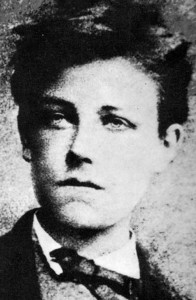Today we salute the nineteenth-century visionary outsider poet, Arthur Rimbaud – whose brilliant but slender volume of work produced in a mere handful of years is often overshadowed by his magnificently audacious life. The legend of Rimbaud centres around five extraordinary years, commencing in 1870, when the prodigiously talented 16-year-old poet from Charleville, 125 miles northeast of Paris, suddenly rejected his provincial middle-class and academically promising trajectory. He began to drink, steal, grew his hair long and ran away from home three times – most notoriously, in February 1871, to join the anarchist insurgents of the Paris Commune. Back in Charleville, Rimbaud wrote two letters and sent samples of his poetry to the eminent Symbolist poet, Paul Verlaine – eliciting the infamous and fateful response: “Come, great and dear soul; we are calling out to you, we are awaiting you.” Rimbaud arrived at Verlaine’s Paris home in September 1871. The two poets promptly fell madly in love and, with no regard whatsoever for Verlaine’s pregnant wife, embarked on a tempestuous affair. Shunned by the Parisian Symbolists, Rimbaud and Verlaine fled to London in July 1872 where they lived in decadent squalor and argued violently. After countless separations and dramatic reunions, the relationship finally ended when, in a jealous rage, Verlaine shot Rimbaud in the wrist and was sentenced to two years of hard labour in a Belgian prison for attempted murder. Rimbaud was left traumatised and disoriented. He returned to Charleville where he completed his two masterpieces, Illuminations and A Season in Hell – his prose account of his time with Verlaine. And then, just five years after his life as a poet began and shortly before he turned 21, Arthur Rimbaud gave up writing forever.
Thereafter, Rimbaud opted out not only from poetry but society as well and became an exotic if somewhat unsavoury vagabond. He joined the Dutch army in 1875, but only to secure free passage to Java whereupon he swiftly deserted. There are records of him trekking across the Alps, working in a German circus, gun-running in Cyprus, slave-trading in Egypt and Yemen before finally settling in Ethiopia where he lived with a “native woman”. He remained there until 1891 when, seriously ill, he made his way back to France and died after the amputation of his right leg at the age of 37.
The legend of Rimbaud, the ultimate enfant maudit, has cast him as an enduring and endlessly fascinating figure of alienation, rebellion and liberty. But lest we forget that beyond the myth, Rimbaud was a groundbreaking “poet of the future” who originated an hallucinative style that would later influence such luminaries as Albert Camus, the Beats, Jim Morrison and Patti Smith. Moreover, Rimbaud expounded revolutionary theories of poetry and life: writing to the poet Paul Demeny in May 1871, his so-called “Letter of the Seer” declared war on the existing artistic order and proclaimed a new Poetic Vision. In one of the most startling and celebrated passages in literary history, 16-year-old Arthur Rimbaud wrote:
“I say it is necessary to be a seer … The Poet makes himself a seer by a long, gigantic and rational derangement of all the senses. All the forms of love, suffering, and madness. He searches himself. He exhausts all poisons in himself and keeps only their quintessences. Unspeakable torture where he needs all his faith, all his super-human strength, where he becomes among all men the great patient, the great criminal, the one accursed – and the supreme Scholar! – Because he reaches the unknown! A language must be found. Moreover, every utterance being an idea, the time of a Universal Language will come!”
Rimbaud prophesized that these poet-seers would lead us to a new age of unbridled intelligence and social utopia. We can but hope he was right. Go Rimbaud!



9 Responses to 10th November 1891 – the Death of Arthur Rimbaud